Acer Predator Helios 18: all the power of the sun
The Acer Predator Helios is a big unit of a machine, but boy does size equal power
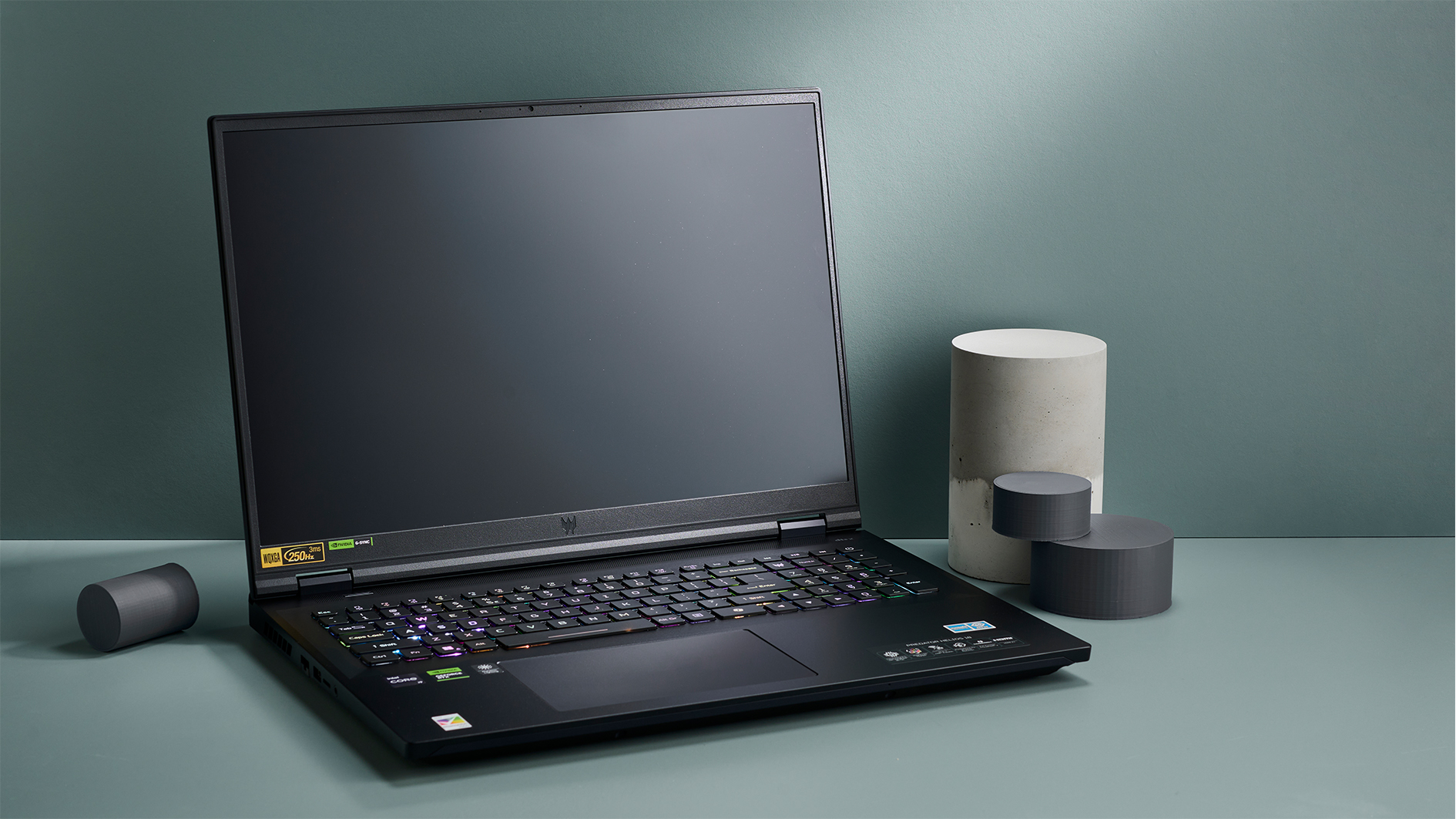
Big-screen gaming doesn't get much better than this. The Acer Predator Helios 18 is a strong contender among gaming laptops with some of the most impressive components available today. The battery life is lacklustre and the Turbo Mode is incredibly loud, but when it comes to playing the latest games at their very best, nothing will get in your way.
-
+
Big, beautiful screen
-
+
Pure, unadulterated power
-
+
A nice middle ground between serious and stylish design
-
-
Turbo Mode is unusably loud
-
-
Disappointing battery life
Why you can trust T3

Naming your laptop after the Greek God of the Sun takes some courage. The most powerful thing in our solar system takes a lot of beating, but the folks at Acer may actually have come up with something to rival that big ol' ball of gas that has been having things its own way for too long.
The Acer Predator Helios 18 is no lightweight gaming laptop, but freed of the restraints of a slimline form factor and small size, Acer has seen fit to stuff it full of the most cutting-edge components on the market. With that of course comes high expectations, so how does this 18-inch monster square up among the best gaming laptops?
Acer Predator Helios 18: Price & availability
Just like eating a meal with premium quality ingredients is more expensive than a fast food restaurant, when it comes to gaming laptops, you get what you pay for. The Predator Helios 18 I was sent with an RTX 4090 GPU and Intel Core i9-14900HX processor will set you back a pretty penny.
The £3499/$3099 price tag may seem steep, but that's not actually too bad for the hardware on offer here. Some machines with the same GPU and CPU can run up to around £5000 (like the MSI Titan 18).
Acer Predator Helios 18 review: Design
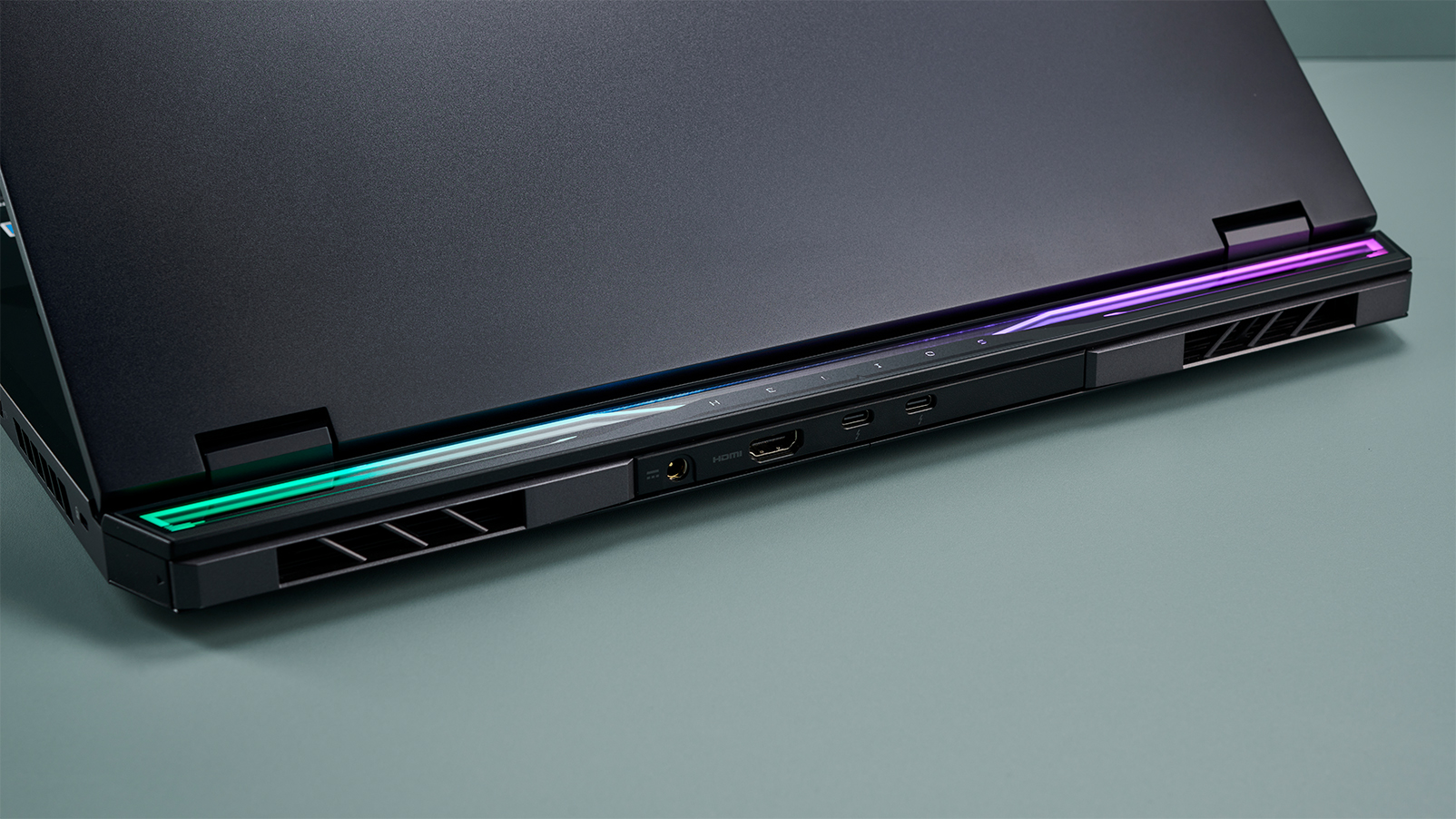
It might sound a bit odd to describe a gaming laptop's design as mullet-like, but that's the case here. It's business in the front and party in the back.
The aluminium shell gives the laptop a premium understated feel on the base, while the plastic bezels around the display and underneath are more functional than fashionable. The front's sole commitment to excess is a tiny RBG Predator logo just below the bottom right corner of the keyboard. It's subtle but fun.
Anything but subtle is the rear. The back of the base features a very prominent light bar that makes up for the lack of RGB on the front, while there are some detachable vents (the Helios comes with a choice of colours) that resemble supercar air intakes.
It may sound a bit disjointed but honestly this is a very handsome laptop.
As for the size, an 18-inch laptop is hardly a portable machine. But the Predator Helio 18 is at least not too heavy, at 3.3kg. I still wouldn't recommend taking it to work every day, though, as this is more of a desktop replacement with some portability.
Acer Predator Helios 18 review: Display
First of all, this is an 18-inch display, so the biggest you'll find on current gaming laptops, and the Helios makes the most of each one of those inches. Unless you're a real snob, you'll have no need for an external monitor, as the built-in screen is capable of some impressive feats.
While a WQXGA 2560 x 1600 resolution isn't as high as some other super-premium laptops, it is a Mini LED offering and sports an impressive 250Hz refresh rate. That's more than enough to make the most of the super-high frame rates you'll get with the Helios' hardware. It also supports HDR 10/HDR 1000, which means you can treat yourself to rich colours and slapping brightness on your favourite titles.
Acer Predator Helios 18 review: Performance
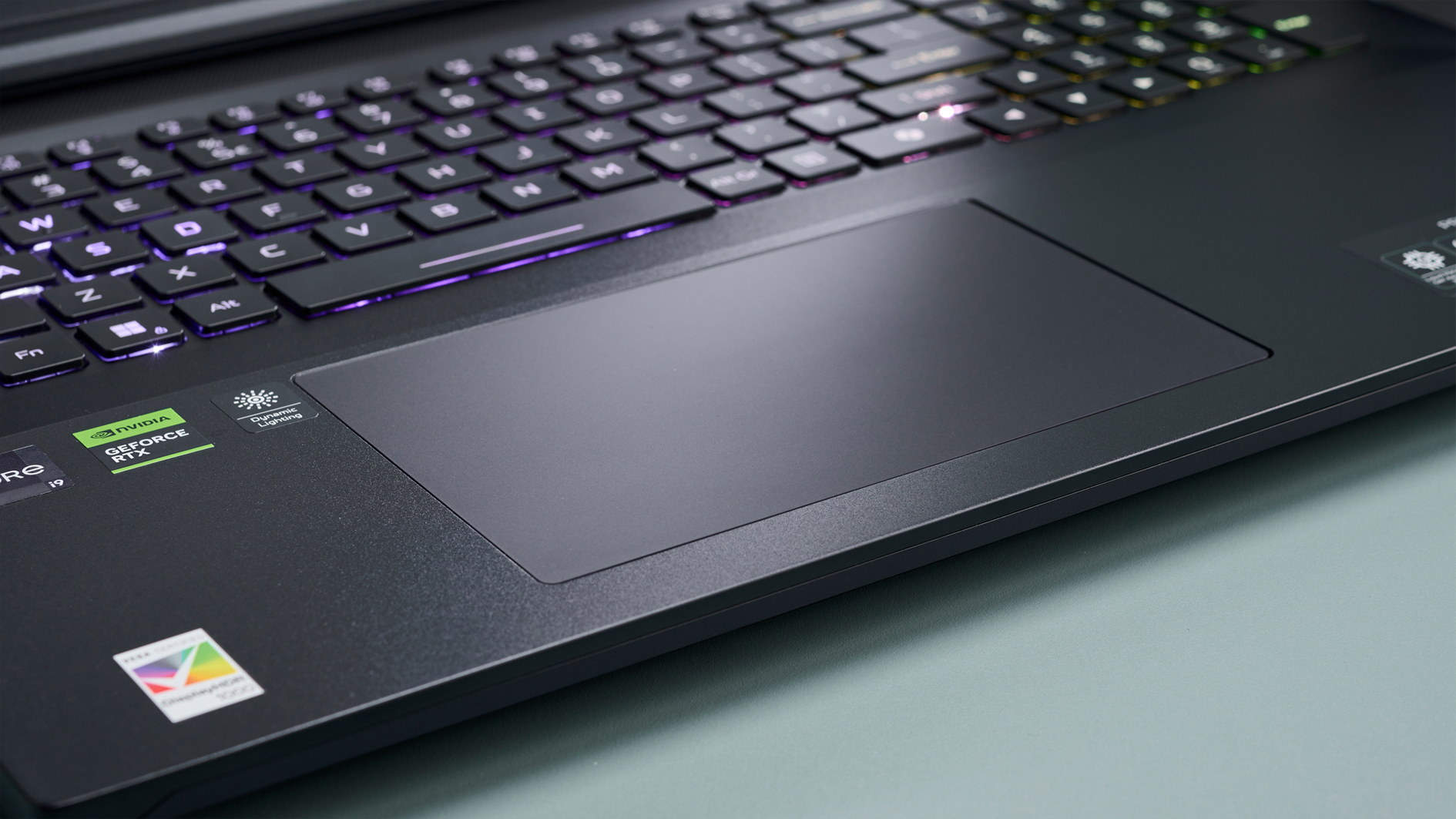
This should be a foregone conclusion, really. At this price tag and with the Intel Core i9-14900HX CPU and Nvidia RTX 4090 GPU there shouldn't be any problem playing even the most taxing games out there.
With that being said, I booted up one of the most beautiful games ever, Deathloop, and excitedly slammed all of the settings to their maximum – including the maximum ray tracing possible. Unplugged, as you'll see with almost every gaming laptop, the Helios struggled to get past about 15fps, but when connected to the (chunky) charger, things improved significantly.
Like other laptops in the Predator range, you can simply press one button to toggle between different levels of performance, cooling, and quietness. The volume of these different profiles varies from obnoxiously NASA-level loud, to near silence. The four different levels are Quiet Mode, Balanced, Performance and Turbo. Just as a word of warning you should never use Turbo, I've seen quieter supernovas and the performance jump is negligible compared to the extra power.
So let's get into the nitty gritty of frame rates. With a 250Hz screen, you'll be able to get theoretically up to 250fps, but even with this cutting-edge hardware that's rarely going to happen with a visually stunning AAA title. On that aching loud Turbo Mode, I managed to clock a pretty consistent 90fps minimum in Deathloop, though. That's an excellent showing for smooth gameplay, but a step down the Performance Mode is several factors quieter and still maintained 80fps. That's an excellent showing. If you're playing in a library you can expect a variable 30-45fps on the nearly silent Quiet Mode.
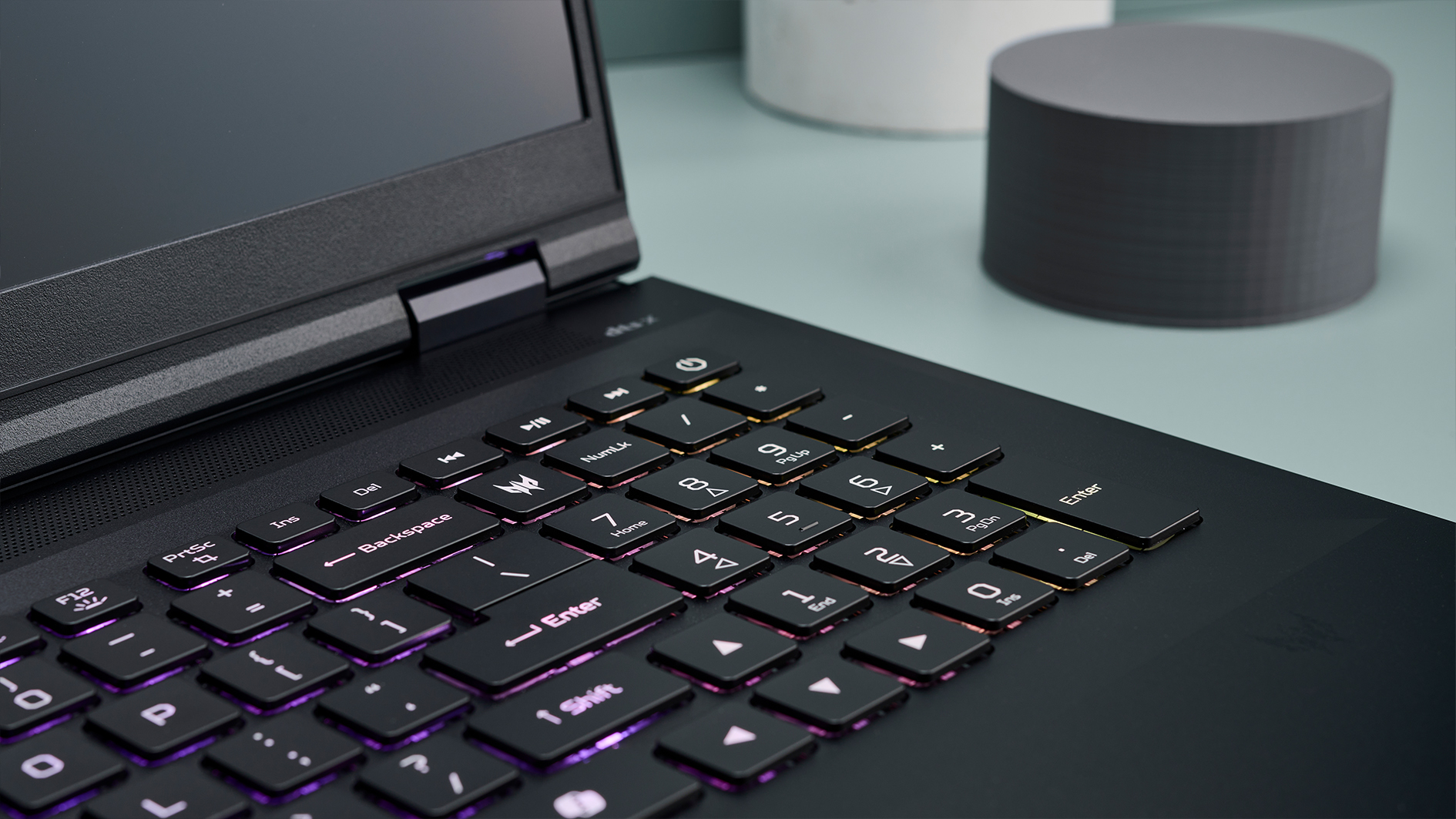
Moving on to a staple of graphical showcases, I booted up racing game favourite, Forza Motorsport (2023), and similarly cranked the settings to the max. The end result was a visually stunning performance with a framerate that struggled in cutscenes but stuck above a consistent 60fps (62fps roughly) on both Performance and Turbo Mode.
As is often the way with gaming laptops, performance when unplugged was much worse. That's because the Intel and Nvidia components can't max out without a power source. But with a laptop this big you probably aren't going to play games on the go anyway.
As for overheating, I had no problems there (despite the Sun God name). It can be a tad warm near the hinge, but with fans this big and loud you're not going to melt the components from pushing this Helios too much.
If you are interested to know Geekbench 5 scores then the Acer Predator Helios 18 clocked a CPU single-core score of 2739 and a multi-core score of 17,217. The GPU registered 184,116. Impressive stats for your gaming wants.
Acer Predator Helios 18 review: Features
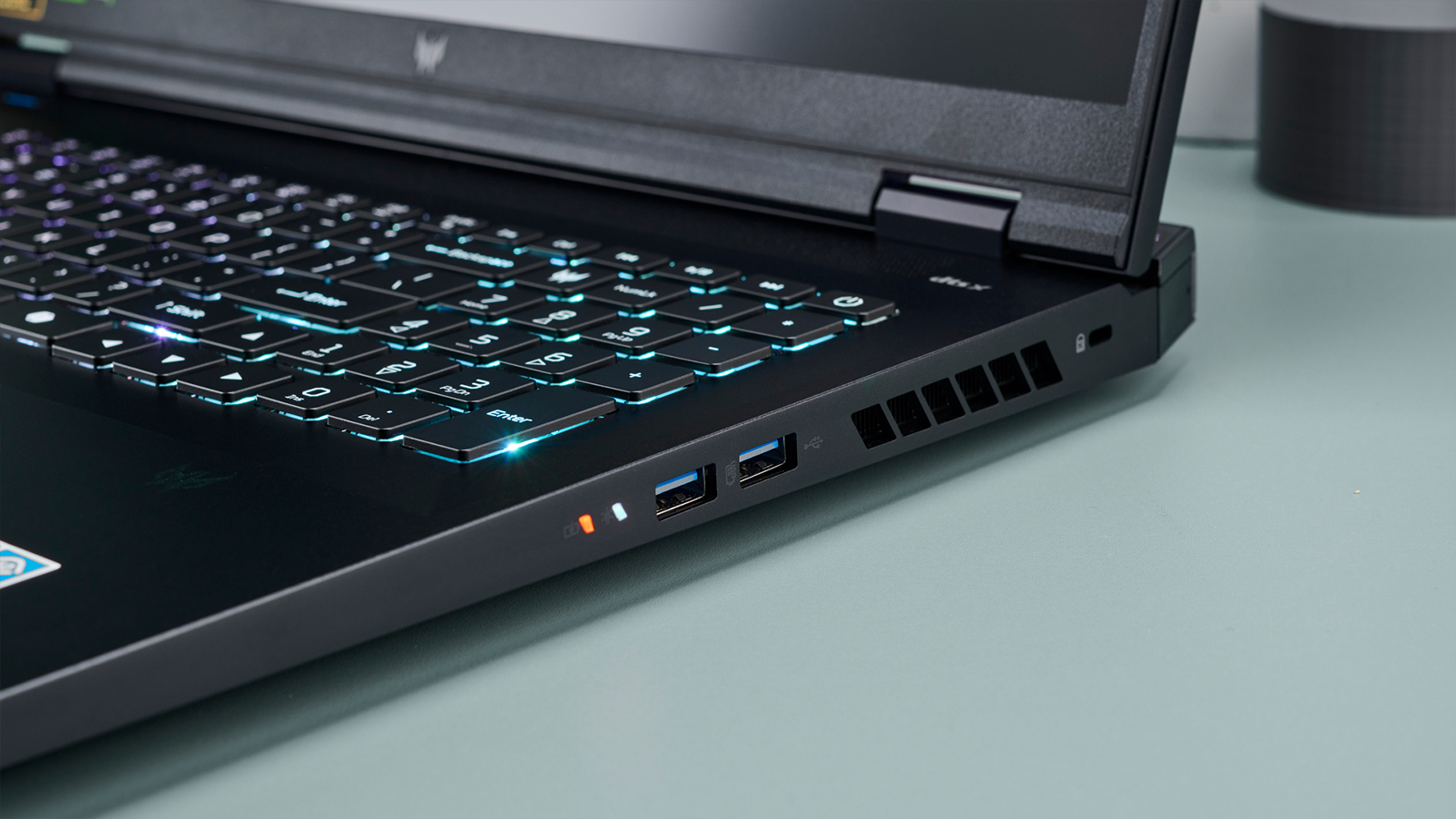
As an everyday laptop, you're unlikely to use a chunky 18-inch machine, but as a desktop replacement there's a lot to love here. The 32GB of RAM is more than enough for workday tasks, while the big screen and DTS X certified speakers make for an excellent streaming experience. Good luck filling up the 2TB hard drive too.
As for ports, you're spoiled for choice. The Predator Helios 18 comes with no less than 3 USB-A style ports, plus two ultra-fast Thunderbolt 4 offerings on the rear. Plus, of course, an HDMI 2.1 connection, Ethernet port, 3.5mm headphone jack, and charging port.
The webcam is a Full HD 1080p effort – but, alas, it doesn't have a slider, so it might be time for the privacy-conscious to pull out some tape.
| Weight | 3.25kg |
| CPU | Intel Core i9-14900HX |
| GPU | Nvidia GeForce RTX 4090 |
| RAM | 32GB DDR5 |
| Display | 18-inch, 2560 x 1600 Mini LED, 250Hz |
| Storage | 2TB SSD |
| Webcam | 1080p Full HD |
| Ports | 3x USB-A 3.2, 2x Thunderbolt 4, HDMI 2.1, 3.5mm, Ethernet, charging |
Acer Predator Helios 18 review: Battery Life
I say it time and time again, but gaming laptops do not possess long battery lives, and this Acer machine is no different. In general use you can probably expect around four hours and when gaming don't expect to play any intense for longer than an hour without needing a charger.
I was hoping that with the laptop's increased size perhaps it would last longer than some of the slimmer machines, but that didn't prove to be the case.
It's also worth noting that to use the Performance Mode, you'll need at least 40% charge, so that's an even smaller window of peak gaming to enjoy.
Acer Predator Helios 18 review: Verdict
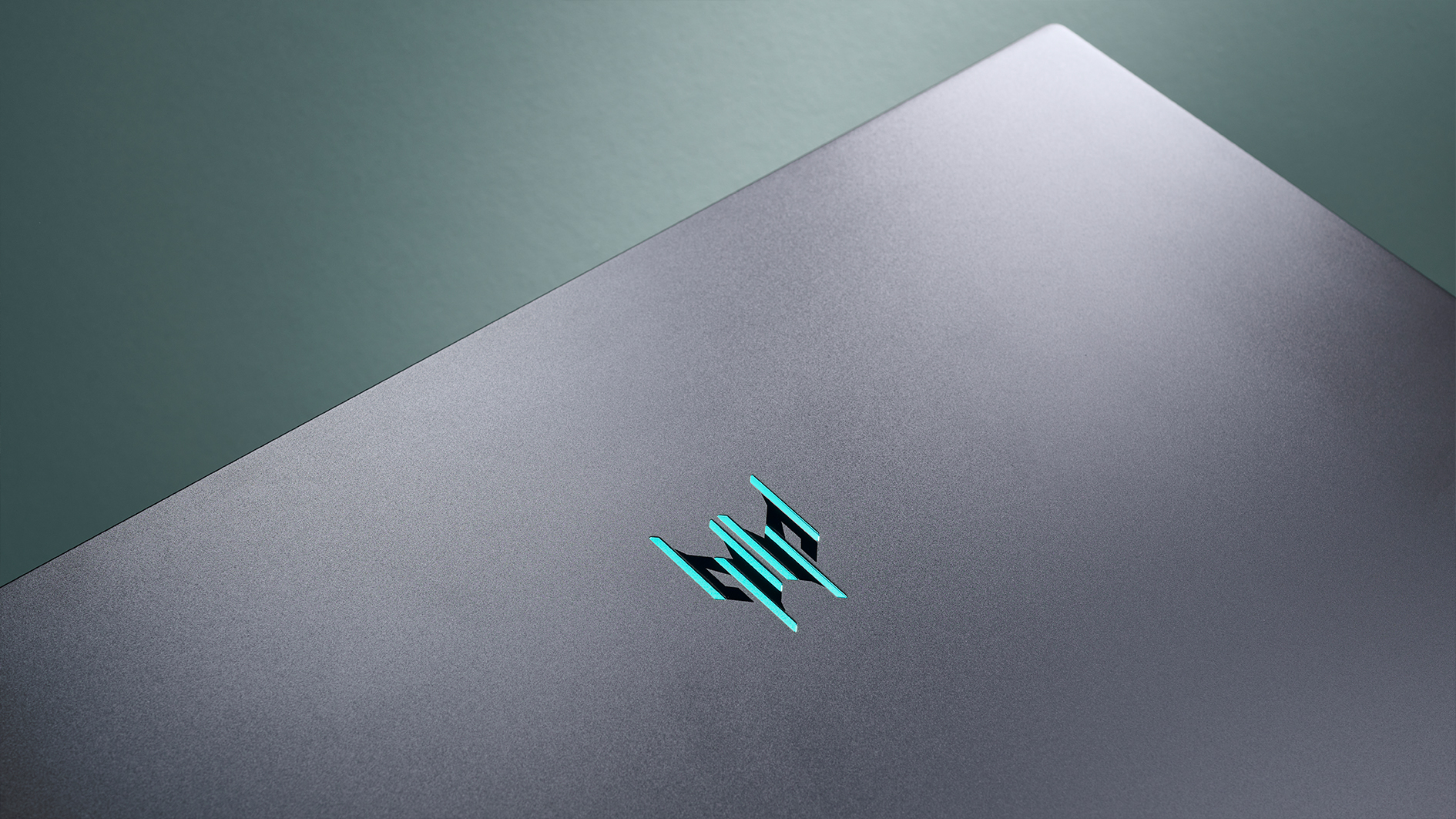
While 18-inch gaming laptops don't come cheap, and neither does the absolute bleeding edge of CPU and GPU technology, the Acer Predator Helios 18 is competitively priced and boasts a lot of grunt.
Don't expect to take it on the go, and keep the charger close, but it's hard not to like this machine for its mix of smart design and impressive Mini LED display. If you've fallen out of love with PC gaming, this could be the machine to bring you back.
Also Consider
Of course, there are other Acer Predator Helios models available. Last year I reviewed the 16-inch version and was similarly impressed (and not as weighed down).
If you want something in between the two, however, then the MSI Raider GE78HX is a stellar 17-inch middle ground. It's super-powerful and stylish too.
But if bigger really is better for you, then you might want to think about the Alienware M18. This is another top-spec big-screen machine that we love.
Sign up to the T3 newsletter for smarter living straight to your inbox
Get all the latest news, reviews, deals and buying guides on gorgeous tech, home and active products from the T3 experts

Andy was T3's Tech Staff Writer, covering all things technology, including his biggest passions such as gaming. If he had to save one possession from a fire it would be his PlayStation 5. He previously worked for Tom’s Guide – where he got paid to play with ChatGPT everyday. When it comes to streaming, Andy will have his headphones glued in whilst watching something that will make him laugh. He studied Creative Writing at university, but also enjoys supporting his favourite football team (Liverpool), watching F1, teaching himself guitar, and spending time with his dog.
-
 Leaked AirPods prototype looks like Nothing... literally
Leaked AirPods prototype looks like Nothing... literallyAnd we are here for them
By Britta O'Boyle Published
-
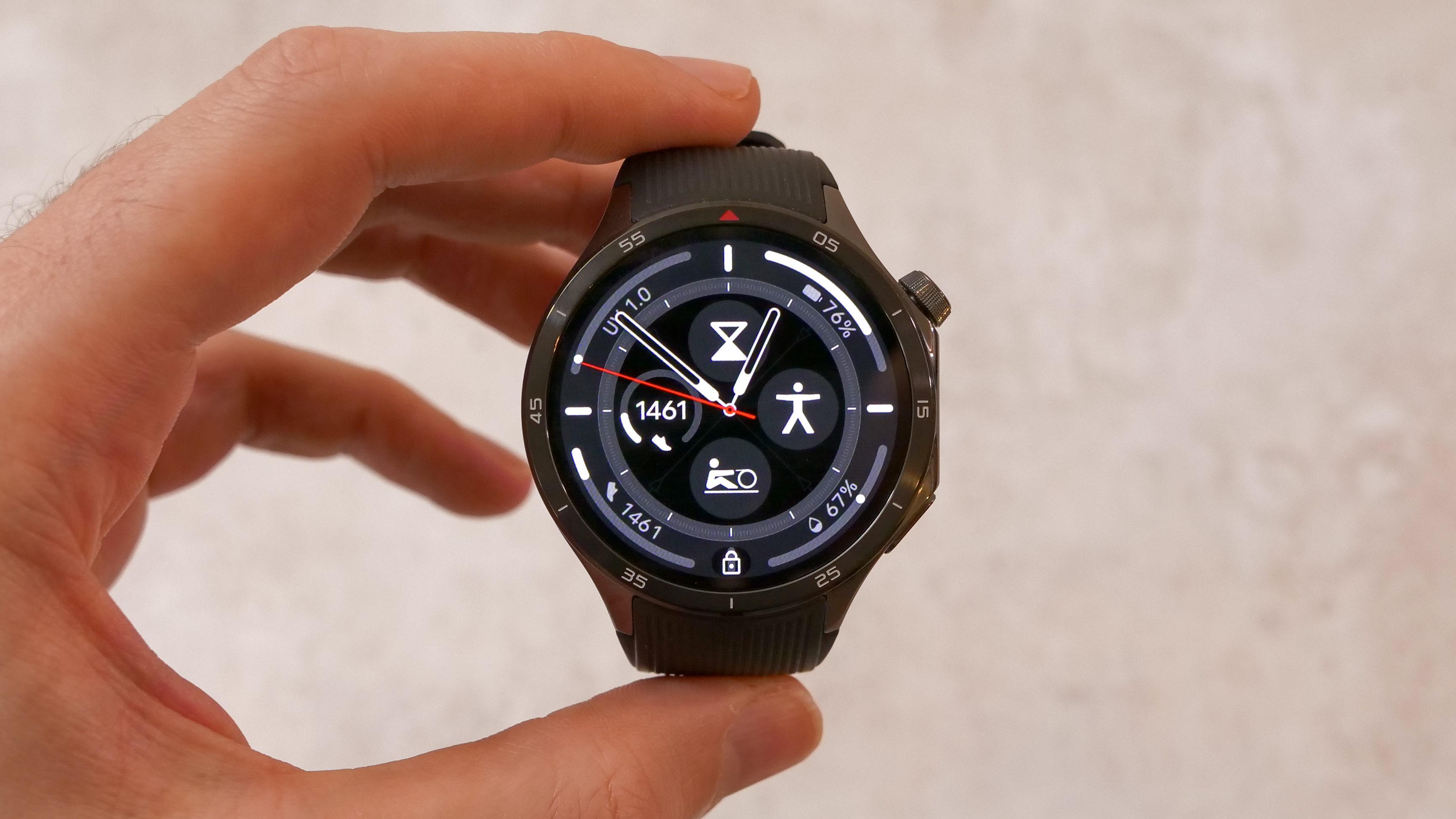 OnePlus Watch 3 lands in the UK with a flurry of freebies and a huge discount
OnePlus Watch 3 lands in the UK with a flurry of freebies and a huge discountThe new titanium-clad smartwatch brings 120-hour battery life, ECG health checks, and some serious launch offers
By Matt Kollat Published
-
 Future YouTube feature could put an end to your doomscrolling
Future YouTube feature could put an end to your doomscrollingAnd that's something we would love to see
By Britta O'Boyle Published